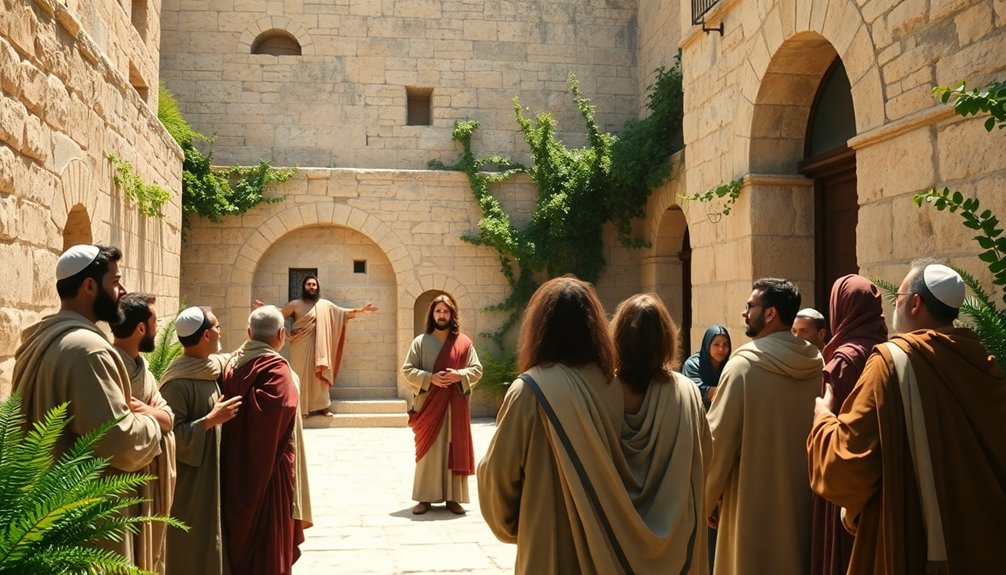Jesus fulfilled over 300 prophecies from the Old Testament, reinforcing His role as the Messiah. Key examples include His birth in Bethlehem and His betrayal for 30 pieces of silver. The odds of any one person accomplishing such a feat are astronomically low, with calculations suggesting 1 in 10^157 for just 48 prophecies. These fulfillments not only affirm His divine identity but also deepen your understanding of salvation. Each prophecy has profound implications and truly highlights the significance of Jesus' life and mission. Discovering the full scope of these prophecies can truly transform your perspective.
Key Takeaways
- Jesus fulfilled approximately 300 specific prophecies from the Old Testament regarding the Messiah's identity and mission.
- J. Barton Payne identified 574 verses that relate to the Messiah, many of which were fulfilled by Jesus.
- Mathematician Peter Stoner calculated the odds of one person fulfilling 48 of these prophecies as 1 in 10^157.
- Key prophecies fulfilled by Jesus include His virgin birth (Isaiah 7:14) and betrayal for 30 pieces of silver (Zechariah 11:12).
- The fulfillment of these prophecies supports claims about Jesus' divine identity and the significance of His resurrection.
Introduction

When you explore the life of Jesus, you'll discover an astonishing number of prophecies that He fulfilled throughout His ministry. In fact, it's estimated that Jesus fulfilled at least 300 prophecies from the Old Testament, solidifying His role as the Messiah. J. Barton Payne identified 574 verses that point to the Messiah, and many of these are seen as being fulfilled in Jesus' life and actions.
Mathematician Peter Stoner calculated that the odds of one person fulfilling just 48 specific prophecies are 1 in 10^157, which highlights the extraordinary nature of Jesus' achievements. For instance, His birth in Bethlehem (Micah 5:2) and betrayal for 30 pieces of silver (Zechariah 11:12) are key prophecies that Jesus fulfilled, demonstrating His divine identity.
The fulfillment of these prophecies not only serves as a foundation for faith in Jesus as the Messiah but also strengthens the claims surrounding His resurrection.
As you delve deeper, you'll find that these prophetic fulfillments offer compelling reasons to believe in Jesus and the significance of His life and ministry.
Messianic Verses in Isaiah

When you look at the Messianic verses in Isaiah, you'll find powerful predictions about the coming Messiah.
Isaiah's words, like the virgin birth and the Suffering Servant, resonate deeply with Jesus' life and mission.
Let's explore the primary and secondary Bible references that highlight these connections.
Primary Bible References
The Book of Isaiah is rich with Messianic prophecies that Christians believe Jesus fulfilled throughout His life and ministry. One of the most notable prophecies in the Old Testament is found in Isaiah 7:14, predicting a virgin birth, which is fulfilled when Jesus was born, as noted in Matthew 1:22-23.
Isaiah 9:6 describes the Messiah as a child with divine titles like "Wonderful Counselor" and "Mighty God," characteristics that Christians attribute to Jesus.
Additionally, the Suffering Servant theme in Isaiah 53 outlines the Messiah's suffering and rejection, particularly in Isaiah 53:5, which speaks of His wounds for our transgressions, aligning perfectly with the New Testament accounts of Jesus' crucifixion.
Isaiah 61:1-2 prophesies the Messiah's mission to bring good news to the poor and proclaim freedom for captives, reflecting Jesus' ministry detailed in Luke 4:18-21.
Finally, Isaiah 42:1 highlights the Messiah as a servant who brings justice to the nations, a role Jesus embodies through His teachings and His position as Savior for both Jews and Gentiles.
Secondary Bible References
Several key Messianic verses in Isaiah further illustrate the prophecies that Christians believe Jesus fulfilled. For instance, Isaiah 7:14 predicts the virgin birth of Jesus the Messiah, calling Him Immanuel, meaning "God with us." This prophecy is foundational for understanding His divine nature.
In Isaiah 9:6, you find a description of the Messiah as a Wonderful Counselor, Mighty God, Everlasting Father, and Prince of Peace, highlighting His authority and purpose.
Isaiah 53 is particularly significant, as it details the Suffering Servant who bears our transgressions and iniquities, reflecting Jesus' sacrificial death. This powerful imagery aligns with the prophecies Jesus fulfilled through His atoning sacrifice.
Additionally, Isaiah 61:1-2 describes the Messiah's mission to bring good news, bind up the brokenhearted, and proclaim freedom for captives, which Jesus cites in Luke 4:18-19, emphasizing His active role in fulfilling all eight of these crucial prophecies from the Old Testament.
Collectively, these Messianic prophecies illustrate the complexity of Jesus' identity—both as the Suffering Servant and the future King, showcasing how deeply intertwined His mission is with the Scriptures.
First-Century Jewish Expectations

First-century Jews held various expectations about the Messiah, shaped by their historical context and scriptural interpretations. Many believed the coming Messiah would be a political leader, restoring Israel's sovereignty and reigning as a king, as prophesied in Isaiah and Jeremiah. This hope reflected a deep desire for freedom from Roman oppression and the revival of the Davidic kingdom.
Additionally, they anticipated that the Messiah would perform miraculous signs, aligning with prophecies in Isaiah 35 that foretold healing and restoration. Different groups within Judaism had varying expectations; for instance, the Pharisees emphasized a spiritual leader who'd guide the people back to adherence to the Law. This diversity illustrated the rich tapestry of first-century Jewish expectations surrounding the Messiah.
While most focused on a triumphant figure, some did consider the concept of a suffering servant as depicted in Isaiah 53. Though less commonly embraced, this viewpoint indicated an awareness that the Messiah might endure suffering for redemption's sake.
Cultural Context of Prophecies

Understanding the cultural context of the prophecies surrounding Jesus reveals how deeply rooted they're in Jewish tradition and expectation. The anticipation for a Messiah who'd deliver Israel from oppression was a significant part of the Jewish experience, shaped by the Old Testament's prophetic texts. Prophets like Isaiah and Micah offered specific predictions about the Messiah's lineage, birthplace, and mission, which influenced how people viewed potential fulfillments.
During Jesus' time, the Jewish culture was filled with a longing for these prophecies to come to fruition. Texts such as Isaiah 53, which describes the Suffering Servant, were interpreted as foreshadowing the expected characteristics of the Messiah. This led to heightened expectations among the people, who yearned for restoration and the establishment of God's kingdom.
As Jesus fulfilled many of these prophecies, it challenged existing cultural and religious paradigms. Discussions arose among Jewish scholars and leaders regarding the nature and identity of the Messiah, creating a complex interplay between their traditional beliefs and the reality of Jesus' life and mission.
In this context, fulfillment of prophecies took on profound implications for both faith and understanding within the Jewish tradition.
Misunderstandings About Prophecy Fulfillment

You might think Jesus only fulfilled a handful of prophecies, but over 300 specific ones point to His life and ministry.
Some skeptics claim these prophecies were retrofitted to match His actions, yet historical evidence shows they were documented long before His arrival.
Debunk Common Misconceptions
While some skeptics argue that the prophecies Jesus fulfilled are merely coincidental, this perspective overlooks the staggering mathematical improbability of one man fulfilling over 300 specific prophecies. Many believe a common misconception is that Jesus deliberately manipulated events to fit these predictions. In reality, numerous prophecies, like His birth in Bethlehem (Micah 5:2), were beyond His control.
Critics also claim that the prophecies were written after Jesus ascended to align with His story, yet historical evidence shows that many Old Testament prophecies predate His birth by centuries. Scholars like J. Barton Payne and Alfred Edersheim point out that over 300 prophecies genuinely point to the Messiah, and Jesus fulfilled at least that many during His earthly ministry.
Moreover, misunderstanding the nature of prophetic fulfillment can lead to the belief that only direct predictions are valid. However, many prophecies serve as types or foreshadows, ultimately realized in Jesus' life and work.
Skepticism About Prophetic Accuracy
Skepticism about the accuracy of prophecies fulfilled by Jesus often stems from misunderstandings regarding their context and interpretation. Many skeptics question whether certain interpretations truly apply to Jesus, arguing they may be subjective.
This skepticism often overlooks the cultural context and intended meanings of the original prophetic texts, which were crafted in specific historical settings.
Critics sometimes suggest that Jesus and His followers orchestrated events to fulfill prophecies, casting doubt on the spontaneity of these occurrences.
Additionally, the sheer probability of one individual fulfilling over 300 prophecies is so low that some skeptics dismiss statistical analyses as oversimplifications of complex theological concepts.
However, they often miss the historical consistency and depth of the prophetic texts, which have been interpreted and debated for centuries.
Faith in Daily Decisions

Your daily decisions can reflect your faith, influencing how you approach both personal choices and community outreach initiatives.
When you align your actions with your beliefs, you not only strengthen your sense of purpose but also inspire those around you.
Engaging with your faith in practical ways can lead to impactful changes in your life and the lives of others.
Daily Faith Choices
Every day presents countless opportunities to make faith-driven choices that can shape our lives and align us more closely with God's purpose. By actively seeking God's guidance through prayer and scripture, you can navigate your everyday decisions with a sense of clarity and direction. Each choice you make, grounded in faith, has the potential for transformed outcomes, reinforcing your commitment to biblical principles.
When you face challenges, choosing to respond with faith not only strengthens your relationship with God but also builds resilience. Regularly reflecting on your decisions helps you assess how well they align with your beliefs, fostering continuous growth. This practice encourages you to live out your faith authentically.
Engaging with a community of faith plays a crucial role in this journey. Surrounding yourself with supportive individuals provides accountability and encouragement, making it easier to integrate faith into your daily life. Together, you can share insights and experiences, helping one another remain steadfast in your choices.
Ultimately, every faith-driven decision you make contributes to a life that reflects God's love and purpose, leading to a deeper sense of fulfillment and connection.
Local Outreach Initiatives
Local outreach initiatives serve as a vital bridge between faith and daily decisions, allowing individuals to actively live out their beliefs in practical ways. Engaging in community service through local outreach not only uplifts neighborhoods but also encourages you to apply spiritual principles in your everyday life.
These initiatives offer various volunteer opportunities where you can contribute to projects that promote social justice and support those in need.
By participating in educational workshops and events, you can connect with others who share your values, fostering a sense of belonging in your community. Faith-based organizations often provide resources that help you make faith-informed choices related to family life, health, and social justice.
This integration of faith and action reinforces the idea that your beliefs can actively influence your surroundings.
Involving yourself in local outreach initiatives enriches your spiritual journey and empowers you to make a difference. As you embody your faith through service, you inspire others to do the same, creating a ripple effect of positive change.
Embrace these opportunities, and watch how your actions can transform both your life and your community.
Prophecy's Enduring Relevance Today

The enduring relevance of prophecy in today's world offers profound insights for believers and seekers alike. When you examine the fulfilled prophecies about Jesus, it becomes clear how they affirm His identity as the Messiah. With at least 300 prophecies fulfilled during His earthly ministry, the intricacy of these predictions showcases not only their significance but also the divine inspiration behind them.
Consider the statistical improbability of one person fulfilling such a multitude of prophecies. Calculated at 1 in 10^157 for just 48 prophecies, this staggering number highlights the extraordinary nature of Jesus' life and mission.
For those exploring their faith, especially among Jewish believers studying the Tanakh, understanding these fulfilled prophecies can lead to transformative realizations about salvation and God's overarching plan.
The enduring relevance of prophecy encourages ongoing exploration of biblical texts within contemporary contexts. Reflecting on these prophecies not only deepens your understanding of Jesus' role but also reinforces the belief in God's sovereignty.
As you engage with these texts, you'll find that the messages contained within prophecies continue to resonate in your life today.
Additional Resources

Exploring the fulfilled prophecies about Jesus not only enriches your understanding of His role as the Messiah but also opens the door to valuable resources for deeper study.
One fascinating resource is the work of mathematician Peter Stoner, who calculated the probability of one man fulfilling just eight prophecies to be 1 in 10^157. This astounding statistic emphasizes Jesus' unique position as the Son of God.
You might also find it beneficial to explore the prophecies related to His betrayal for thirty pieces of silver, as prophesied in Zechariah 11:12.
For a more structured approach, consider reviewing detailed charts that outline the 70 major prophecies fulfilled by Jesus.
Books like "Science Speaks" delve into the statistical analysis of these prophecies, providing a scientific perspective on their fulfillment.
Moreover, Jewish Rabbis have long discussed the significance of these prophecies in relation to the coming Messiah, enriching your understanding of the context.
Finally, don't overlook the profound theme of the forgiveness of sins, which ties directly to Jesus' fulfillment of prophecies and His mission.
These resources can greatly enhance your study and appreciation of Jesus' prophetic role.
Frequently Asked Questions
How Many Prophecies Were Fulfilled by Jesus?
When you explore the prophecies about the Messiah, you'll find a significant number that point to Jesus.
Scholars have identified various verses throughout the Old Testament that hint at His life and mission.
The remarkable aspect is how specific these predictions are, including details about His birth and actions.
This makes you consider the sheer improbability of one person fulfilling so many prophecies, emphasizing the strength of faith in Jesus' identity as the Messiah.
How Many Prophecies Did Jesus Fulfill in Probability?
When you consider the probability of one person fulfilling numerous prophecies, it's mind-boggling.
Mathematicians have calculated that the odds of fulfilling just eight specific prophecies are about 1 in 10^28.
If you expand that to 48 prophecies, the odds jump to an astonishing 1 in 10^157.
These numbers highlight the unlikely chance of coincidence, suggesting a divine influence rather than mere randomness in those fulfillments.
What Prophecies Did the Bible Fulfill?
When you explore the prophecies fulfilled in the Bible, you'll find numerous instances that align with historical events.
For example, the prophecy of a coming Messiah is fulfilled through Jesus' life, including details like His birthplace in Bethlehem and His virgin birth.
Other significant prophecies, like His betrayal and crucifixion, highlight the depth of these predictions.
Each fulfillment strengthens the narrative and deepens your understanding of the Scriptures' significance.
How Many Times Did Jesus Predict?
You'll find that Jesus made several significant predictions throughout His ministry. He foretold His own suffering, death, and resurrection multiple times, specifically mentioning it in passages like Matthew 16:21.
Notably, He predicted His resurrection on the third day at least three times. Additionally, He spoke about His betrayal by Judas and Peter's denial before the rooster crowed.
Each prediction highlights His foreknowledge of the events that were to unfold.










